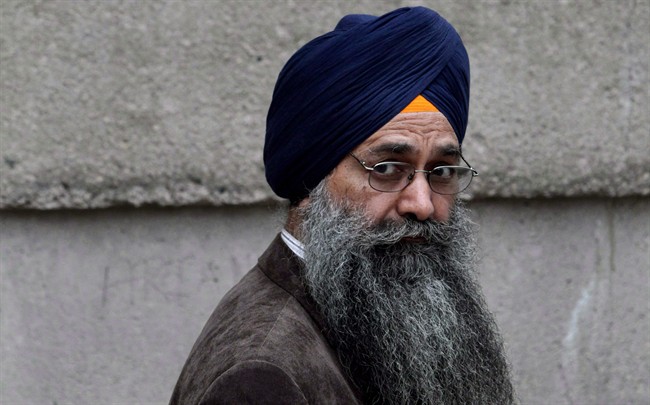VANCOUVER – Air India bomb maker Inderjit Singh Reyat is remorseful about the bombing deaths and gained nothing by lying during testimony against his co-accused, his lawyer told the B.C. Appeal Court.

Ian Donaldson said Wednesday those are good reasons to cut short Reyat’s nine-year prison sentence for lying 19 times during the bombing trial.
Unlike other serious perjury convictions, Reyat did not concoct a false tale to exonerate anyone, Donaldson told the three-member panel.
The lawyer said Reyat merely didn’t tell the whole truth when he said, for example, he did not know the names of some key players believed to be involved in the plot.
Reyat — who has spent most of his adult life behind bars — was convicted of perjury in 2010 for his testimony as a Crown witness at the 2003 trial of Ripudamen Singh Malik and Ajaib Singh Bagri.
Malik and Bagri were acquitted of mass murder and conspiracy charges in the June 23, 1985 bombing that sent the Air India jet into the Irish Sea, killing all 329 people aboard.
Reyat pleaded guilty to manslaughter in the bombing for supplying the bombing parts and testified during the trial.
Donaldson argued that Reyat has already been severely punished for his crimes and was sorry about the deaths.
- Comox Valley issues State of Local Emergency due to flooding, 1 person may be missing
- B.C. government launches selection process for AI, data centre projects to compete for power
- Board of Metro Vancouver meets to address affordability, spending
- Virginia warehouse sale to ICE won’t proceed, B.C.-based Jim Pattison group says
Reyat’s sentence should be cut to six or seven years in prison, instead of the precedent-setting nine year-term he was given in 2010, Donaldson said.

Get breaking National news
“It’s my respectful submissions that he did indeed repeatedly expressed remorse for his actions that led to his sentencing, and that it was an error for the trial judge to say at the perjury trial that because he didn’t tell the truth when called at the Malik and Bagri trial, he’s not remorseful for his own actions,” he said.
“When the sentencing judge says, in effect, his prospects for rehabilitation are dim … that ignores the uncontradicted evidence, the overwhelming evidence that this man since 1985, 1988 — when he went into custody — has been of excellent, indeed impeccable, behaviour.”
Justice Mary Saunders immediately contradicted Donaldson.
“Except, in the end, as the judge said, (Reyat) has rejected one of the values of Canadian society, which is the administration of the justice system,” she said.
“And he did so by refusing to say that which he knew when questioned at the Air India trial,” she noted.
Saunders also said she’s not sure which is worse, fabricating a story or fudging the truth.
“In a peculiar way, it is very, very bad to have somebody testify and give a completely false account,” she said.
“There is something almost inherently more offensive to have somebody sit there and say, ‘I’m not going to tell you, I don’t remember,’ coming up with little lies and prevarications that completely eliminates the potential of finding out what that witness would be prepared to say.”
She also said that Reyat’s perjury trial was unlike any other.
“We have a witness who is the only person in the criminal justice system held to account for anything to do with that bombing, and he refused to divulge information at a murder trial of this nature,” she said.
“The potential for interference of the administration of justice is so great, it’s hard to contemplate how much graver it could be except, I guess, cooking up a story that proved not to be the case and resulting in a conviction or a false acquittal.”
The Supreme Court of Canada rejected Reyat’s bid for an appeal of his perjury conviction earlier this year.
Reyat’s testimony was part of an agreement that saw him plead guilty for his role in the bombing of flight 182, which was bound for London from Vancouver.
An hour later, a bomb destined from another Air India plane exploded in Tokyo, killing two baggage handlers.
Reyat pleaded guilty to manslaughter in both bombings, receiving a total of 15 years in prison.
Crown counsel Len Doust doubts, as did the sentencing judge at Reyat’s perjury trial, that any remorse the man showed towards the families of the Air India bombing victims were sincere.
“In the witness box, Mr. Reyat behaved like a man still committed to a cause which treated hundreds of men, women and children as expendable,” Doust said on Wednesday.
Reyat may not have planned an elaborate lie, but he did intend to obstruct the truth, he said.
“He was completely evasive, in my submission, in regard to the whole issue of who made the bomb, and how the bomb was made …,” Doust said.
Doust argued that the nine-year sentence, believed to be the longest perjury sentence in Canadian history, is appropriate.
The judges have reserved their judgment.







Comments